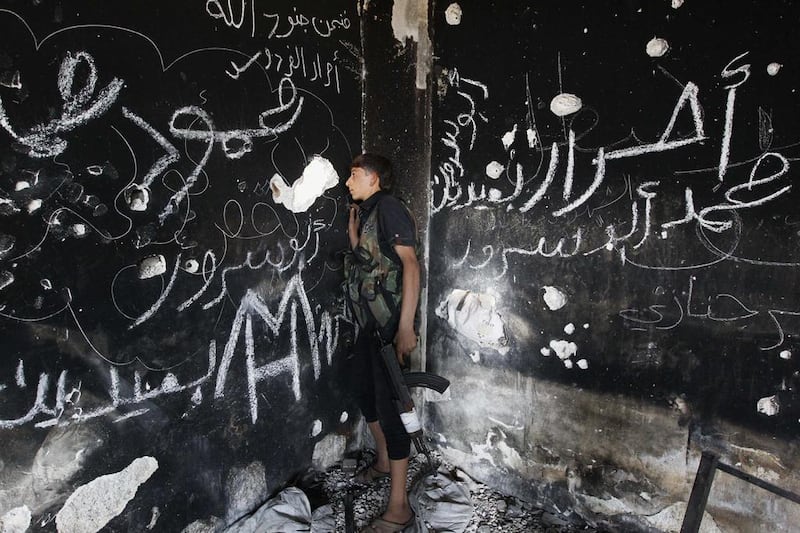NEW YORK // Inspectors from the international watchdog responsible for overseeing the destruction of Syria’s chemical weapons will begin examining the stockpiles by Tuesday.
Syria must provide the inspectors with security and access to all toxic weapons sites, a draft document from the Organisation for the Prohibition of Chemical Weapons.
The OPCW was to vote on the decision on Friday night at its headquarters in The Hague.
The inspections are crucial to any UN resolution on Syria’s chemical weapons programme.
Ending weeks of deadlock, the five permanent members of the UN Security Council reached an agreement on Thursday on a resolution to eliminate Syria’s chemical weapons.
The draft agreed to by Russia, China, the United States, France and Britain demands that Syria abandons its chemical stockpile and allows unlimited access to them.
If Syria fails to comply, the draft says the UN Security Council would need a separate resolution to impose action, including possible military strikes, against Damascus.
The diplomatic push to find some agreement on Syria was triggered by an August 21 poison gas attack that killed hundreds of civilians in Damascus suburbs and the threat by the US president, Barack Obama, to use military force.
GCC ministers condemned the use of chemical weapons in Syria, after meeting John Kerry, the US secretary of state, on Thursday.
The ministers, including Sheikh Abdullah bin Zayed of the UAE, said “those responsible for all crimes inflicted by the Syrian regime against the Syrian people must not escape justice and must be held responsible”.
“Bashar Al Assad and his top aides, who are responsible for the massacres inflicted upon the Syrian people, have no place in the transitional body or thereafter,” they said, adding that the Geneva process should make the “regime-sponsored May 2014 elections irrelevant”.
UN inspectors are in Syria investigating seven alleged chemical weapons attacks, but are not expected directly to pin the incidents on any particular party to the Syrian conflict.
They leave Damascus on Monday and will have a report prepared by next month.
Western countries and Russia believe Syria has about 1,000 tonnes of sarin, mustard and VX nerve gas, which is stored at dozens of sites.
The OPCW decision authorises its inspectors to search suspected chemical weapons sites not declared by Damascus.
It also calls on member countries to fund the operation to destroy the weapons in Syria, which will be carried out in the middle of a civil war.
The inspectors will have 30 days to visit all chemical weapons centres declared by Syria last week.
Most countries that have eliminated their stockpiles, in peacetime, have taken decades to carry it out. Syria has been given until the middle of next year.
It is also required to appoint someone to oversee the disarmament process, and by November 1 it must have destroyed all chemical weapons factories, under the draft.
Once the OPCW executive council authorises the plan, it will be incorporated into the UN Security Council resolution on Syria’s chemical weapons disarmament, which was expected to be voted for on Friday, Saturday or Sunday.
While the draft UN resolution ends an impasse between Russia and the US, it does not contain the enforcement trigger the US had insisted upon.
But US and British diplomats hailed the agreement as a breakthrough.
“Just two weeks ago, tonight’s outcome seemed utterly unimaginable,” US ambassador to the UN Samantha Power said after Thursday’s Security Council meeting.
The UN resolution would be the first time the council had placed binding obligations on the Syria since the uprising against president Bashar Al Assad’s government began more than two years ago.
The resolution will not assign blame but it does call for the perpetrators of the attack to be held accountable.
Mr Al Assad agreed to destroy the chemical weapons, which until two weeks ago he denied ever possessing, after the August 21 attack.
As congressional support withered for Mr Obama’s call to fire missiles at Syria, Mr Kerry said in an offhand remark that an attack could be averted if Mr Al Assad turned over his weapons within a week.
The Russian foreign minister, Sergey Lavrov, quickly pushed for such an agreement and by September 13 a framework deal had been agreed to by the two countries.
They hailed the chemical weapons deal as a first step on the path back to stalled Syrian peace talks in Geneva.
On Friday, Mr Kerry was to meet UN envoy for Syria, Lakhdar Brahimi, to discuss the Geneva process.
tkhan@thenational.ae
* With additional reporting by the Associated Press





